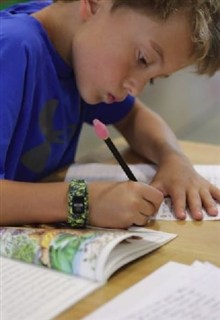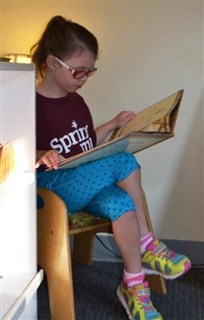News
News
Authentic Student Assessment

Elementary students are completing their annual Student Profiles which will come home next week! Designed to show a child’s annual progress at Springmont, they include his/her end-of-year Progress Report, selections of the child’s work, examples of creative expression chosen by the child and a written reflection of the school year. The profile offers a well-rounded expression of a child’s many areas of growth and development as a learner, creator, communicator and social being.
According to research at the Harvard Graduate School of Education regarding determinants of student success, “a high GPA, SAT score, or IQ is not an accurate indicator or barometer of success later in life. …most high numbered students turn out to be quite ordinary achievers as adults.” As a result of this study, Harvard set out to determine the necessary elements for creating a climate for learning and the elements of authentic assessment as predictors of future success.
The outcome of their research identified the following to be the necessary elements for learning:
• Introduce students to general concepts rather than only the component skills
• Allow opportunities to explore new concepts
• Integrate the areas of study
• Afford students the opportunity to:
o make decisions
o make mistakes
o build on previous activities, successes and failures and meet greater challenges through the process
And the components of authentic assessment to be:
• Observation by the teacher
• Ongoing assessment and feedback
• Student’s self-reflection and self-evaluation
These findings confirm our school’s mission and culture of engaged learning. Look for your child’s Student Profile next Thursday, May 25. Happy reading!
Curiosity. Mastery. Wisdom. Distinction.
What’s the Springmont distinction? There is a great scene in Everybody Loves Raymond where mom goes to talk to the math teacher about how her Elementary-age daughter feels about math. The teacher tells mom he doesn’t care about those things; he cares only that his students know math. This scene is the antithesis of the distinctive Springmont approach, where knowledge and the human experience intersect. Our highest aspiration for our students is to know things – a vast number of things which they use to become wise - and lead fulfilled lives. How is that done? Curiosity. Mastery. Wisdom. Distinction.
Social psychologist Peter Benson identified this distinction as human thriving – it is different from management and control of children, test scores, safety, physical health or athletic rank. Benson spent his life studying the vocabulary of human thriving - fulfillment, joy, kindness, generosity, passion, in love with life, contributor to society, compassion.
Human thriving starts with knowing one’s one true talent or spark - the core of who we are and what we bring to life. This spark provides hope, direction and purpose. You may wonder why I mention this. Springmont is a school. Academic accomplishment is the goal. Competitive placement in high school is expected.
But here’s the thing…Benson determined that human thriving requires knowing one’s affinity, having three champions and opportunity. Of those researched, 100% understood spark and 66% could identify their spark, but less than half of those had champions and opportunity. This included the smart kids who knew things. This included the kids in great schools. This left 75% of those studied NOT on the path to human thriving. Academics alone is not distinctive.
So, students must know stuff to be prepared for their future, and there’s a lot of knowing and understanding going on here today, but our students love school, thrive and find success at Atlanta’s finest high schools because we know innovation comes from the inside. Human thriving comes from the inside. Developing and discovering the spark happens in childhood. Distinction follows the intersection of content mastery and the spark, unique to each student. Nurturing both, as one informs the other, creates a distinctive student, easily identified in a crowd. Grandparents enjoyed fantastic examples of distinction in the students who presented at Grandparents & Special Friends Day last Friday, and we have the opportunity to see more such examples at the upcoming Graduation of our 8th year students. I look forward to seeing you there!
Ask a Division Head: Why Doe My Child Want to Read the Same Book Over and Over?

Congratulations, your child is on the cusp of acquiring a skill that sets humans apart from all other animals! Just as early man found ways to record their thoughts and ideas to preserve them over time and space, reading and writing are significant milestones in your child’s development and some of the highest forms of human interaction. This journey commenced when you began to read to your child.
You may remember that there were books your child wanted to hear over and over, and to this day, you and your child can probably recite those books from memory. While we may have found this tedious, it is vital to your child’s development. Over time, hearing the same story over and over built a strong pathway in your child's brain. He or she came to rely on the rhythm and pace of your reading, and as you read, you built his/her vocabulary and love of reading. As your child begins to read on his own, the same repetition takes place, building skills and confidence.
Reading familiar books, rather than having to always sound out new text, can be valuable for beginning readers. Repetition creates confidence, and confidence creates opportunities for growth. Reading the same book over and over allows your child to solidify the skills he/she is learning and to get ready for the next leap in learning. Reading for intonation, rhythm and rhyme are just as important as reading content because they enable children to reach what is known as "total reading." This refers to not only being able to read the words that make up a passage, but also to be able to understand the writer’s meaning and intent, and to recognize grammar and sentence structure. Try to remember that any reading is good. Let the focus be on pleasure rather than pressure to read longer or more difficult passages. Don't count minutes or pages or words. Help your child along the pathway to a reading mastery and a lifelong love of reading by keeping it light and enjoyable.


1 weeks ago
1 weeks ago